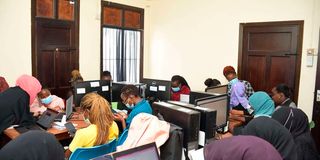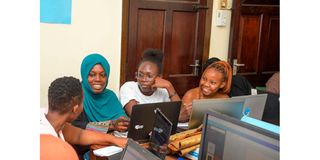The young women using digital tech to achieve financial freedom

Girls being trained at the Pwani Teknowgalz in Mombasa. The technology organisation, which is the brainchild of Aisha Abdulkadir, is equipping girls and young women in marginalised communities in Kenya with employable practical skills in Stem fields.
What you need to know:
- A 2021 study, Kenya’s Digital Economy: A People’s Perspective, found that only 35 per cent of women use advanced digital services, compared with 54 per cent of men.
- According to the study, discrimination, harmful social norms, education divide, geography and lack of motivation are some of the contributors to this gender digital divide in Kenya.
When Elizabeth Wambita completed her university education early last year, she desperately needed a job to help her make ends meet.
Her spirited attempts were, however, unsuccessful, with her numerous job applications not bearing fruit. A friend then told her to apply for a six-month internship that was being offered by Lake Hub in Kisumu. Her application was successful and she underwent rigorous training in digital marketing, web design and logo design.

Elizabeth Wambita, a beneficiary of Lake Hub programme in Kisumu. Elizabeth together with friends, after the training, founded Femitech Developers, a startup technology company that focuses on providing highly innovative IT services.
Lake Hub is a technology and social innovation hub dedicated to bridging the skills gap for Africa's women and youth through innovative learning and development.
Armed with the knowledge and skills acquired, Elizabeth and some of her friends last year founded Femitech Developers, a startup technology company with a focus on providing highly innovative IT services to transform society and business services.
Some of the services include web creation and management, canvas services, graphic design, search engine optimisation (SEO) services, online marketing through Facebook ads, Twitter, emails, computer packages, photocopy, printing and content creation.
“The digital training was godsend, I am doing online writing, thereby earning some income. Our new company has also been generating income for us. We have been building websites, and doing digital marketing for our clients,” Elizabeth tells Nation.Africa.
Also read: Women make gains in tech world
For Charity Nelima, getting an internship at Lake Hub in 2021 was life-changing. She was then a third-year student undertaking a Bachelor of Science in Information Technology at Maseno University.

Charity Nelima, a beneficiary of digital literacy training at Lake Hub, in Kisumu. She was trained in software development and programming.
At Lake Hub, she trained in software development and programming languages like JavaScript, React, Node-js and Bootstrap. “My training at Lake Hub acted as the foundation of my career growth. The skills I got have helped me build my portfolio and get many jobs. I, together with my colleagues, were outsourced by companies looking for front-end developers, back-end developers, IT experts, and full-stack developers.”
Closing gender digital gap
The story of the two young girls is a testament to how interventions meant to bridge the digital gender gap in Kenya are bearing fruit. A 2021 study, Kenya’s Digital Economy: A People’s Perspective, found that only 35 per cent of women use advanced digital services, compared with 54 per cent of men. According to the study, discrimination, harmful social norms, education divide, geography and lack of motivation are some of the contributors to this gender digital divide in Kenya.
The 2019 Groupe Speciale Mobile Association (GSMA) Mobile Gender Gap Report had indicated that women in Kenya are 39 per cent less likely than men to have access to mobile Internet and 23 per cent less likely to own a smartphone.
Aisha Abdulkadir – the co-founder of Pwani Teknowgalz, a women-led, community-based tech organisation that equips girls and young women in marginalised communities with skills – knows all too well the extent of gender digital gap.
As a Bachelor of Information Communication Technology student at the Technical University of Mombasa, she was amazed by the low representation of women in her class. In a class of 60, only four were girls. She could not understand why that was the case.

Girls being trained at the Pwani Teknowgalz in Mombasa. The technology organisation, which is the brainchild of Aisha Abdulkadir, is equipping girls and young women in marginalised communities in Kenya with employable practical skills.
“When I decided to find out why women were few in our class, I found out that girls feared and lacked the confidence to take science, technology, engineering and mathematics (Stem) courses. They viewed them as tough courses that were only tailored for boys and men. I had to step in and change that notion,” she says.
She was inspired to act and bridge this gap. This is how Pwani Teknowgalz was born. Aisha tells Nation.Africa that the organisation is equipping girls and young women in marginalised communities in Kenya with employable practical skills in Stem, with the aim of empowering them economically to contribute to the digital economy. They are taught how to develop websites, profiles, logos and content that will attract traffic and clients for their products.
Amina Abubakar is a beneficiary of Pwani Teknowgalz. She underwent training in web development and digital marketing. Using the knowledge of digital marketing she acquired, she can now showcase and market her products in social media.
“I market my outfits on social media platforms like Instagram, Facebook and Twitter, which have really helped me to increase my clientele, thus enhancing my income,” Amina, who sells clothes, says.
So far, Pwani Teknowgalz has empowered 6,000 young women with digital literacy skills. They are drawn from Mombasa, Nakuru, Kisumu, Lamu and Nairobi, among other counties.
Valerie Ajwang was devastated after failing to secure a job after completing her undergraduate studies in environmental science. But determined to find something constructive to do, she joined the FEMIDEVs programme at The Border Hub, where she secured technical opportunities.
“Currently, I am an instructor of ICT programmes at Amase Technical Institute and a graphic designer at Saval Graphics. I have used technology to tap into the SDG and climate change world. I am happy to share personal milestones that I have made in the tech world,” she says.
Valerie reveals that she has blended environmental science with tech. Last year, she took part in the innovation week and represented the Busia team at Lake Hub, Kisumu. This year, she took part in the tech innovation challenge on International Women’s Day and her project emerged the best.
“Sometimes, all you need is someone to spike your interest in something else then you have a blend. Initially, I did not have a feel for technology, but right now, I am a Generation Z that is out to keep up with the dynamic technology world. The Boarder Hub gave me the piece I was missing to make me a great environmental scientist,” Valerie tells Nation.Africa.
Ms Dorcas Owino, the founder of Lake Hub, observes that the digital gender gap is a serious issue that needs urgent attention. She notes that despite significant progress in recent years, women still lag behind in access to and adoption of digital technology, a situation that has far-reaching implications for their economic opportunities, social mobility, and overall wellbeing.
“Bridging the digital gender gap in Kenya is essential for promoting gender equality and women's empowerment. It is also critical to achieving the country's development goals, including poverty reduction, economic growth, and improved healthcare and education outcomes,” says Ms Owino.
To bridge the gap, the IT specialist is rooting for programmes that target women and girls, including those that improve access to digital technology, provide targeted digital literacy, address sociocultural and norms, and create gender-responsive policies. She says massive investment in digital infrastructure, education and training, and policy interventions are also needed.
At Lake Hub, Ms Owino reveals that they have launched several programmes aimed at bridging the digital gender gap, key among them FemiDev, a comprehensive six-month training programme that provides women with the skills and knowledge they need to start a career in technology. It includes training in programming, design thinking, entrepreneurship, leadership, mentorship and networking opportunities.
“In addition to FemiDev, Lake Hub has also organised hackathons and coding boot camps for women, as well as networking events that provide women with opportunities to connect with industry professionals and peers. We also partner with other organisations to provide mentorship opportunities for women in tech,” Ms Owino says.
Hurdles
Dr Antony Luvanda, a senior lecturer in information technology at the Defence Forces Technical College at the National Defence University, notes myriad factors that broaden the divide. He cites inadequate infrastructure, insufficient numbers of ICT personnel, poor advocacy of digital technology careers, gendered social norms, and lack of women role models in digital technology for girls and women.
Dr Luvanda says these factors have led to persistent inequality, with women not accessing the same opportunities to join the digital technology space as men.
“We, therefore, need to embrace a better approach to mitigating the cumulative disadvantages that lead to the exclusion of women from the digital space and careers. Digital technology is an enabler and driver of both innovation and entrepreneurship, and by not having enough women in this space, we are simply locking them out of these two important components,” he says.
He, for example, terms shocking, the findings of gender digital divide research he conducted last year. “In the research, we could not, for example, find a girl in primary school who could name a single technology career. Awareness of the existing digital technology careers is clearly lacking among girls.”
Dr Luvanda notes that the low rate of women undertaking digital studies has culminated in underrepresentation of women in ICT careers, thus widening the gap.
To increase the number of women in digital space, the don emphasizes the need to build girls’ interest in ICT during their early years, increase advocacy and awareness, and enhance vocational counselling for girls.
Dr Luvanda, who is the co-founder of Magharibi Hub, is working in partnership with Brookings and the Rocker-Feller Foundation to set up a community digital venture in his village to serve girls and young women.
According to UN Women, 3.7 billion people globally have no access to the Internet, with half of them being women. The UN agency says having more women connected to the Internet gives them a chance to earn additional income, increase employment opportunities and access knowledge and general information, consequent to their empowerment.
The story has been supported by a grant from Journalists For Human Rights (JHR) through its Voice for Women and Girls' Rights project.




